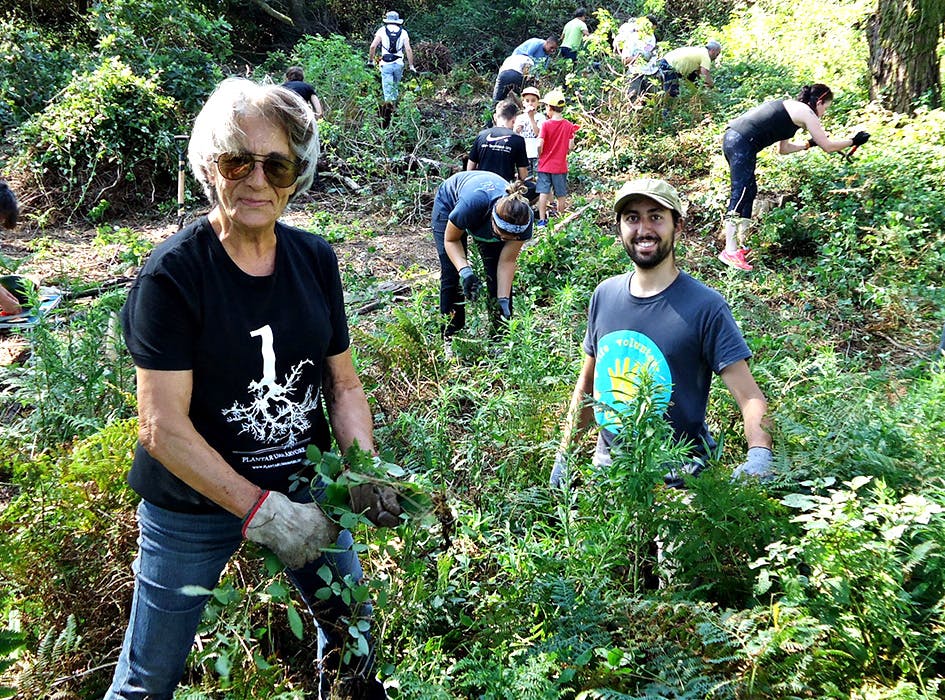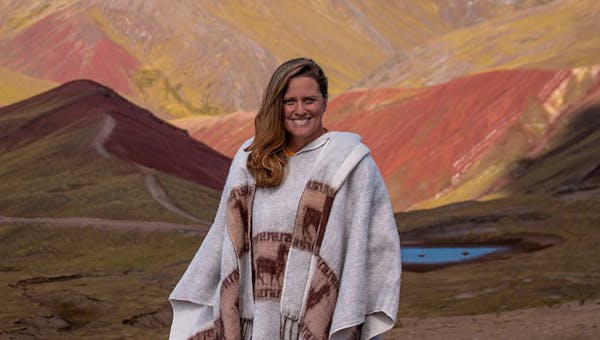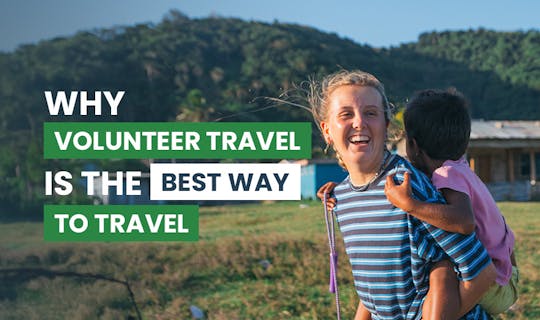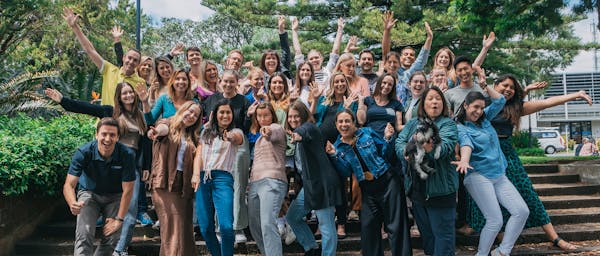This experience helped me gain a lot of self-confidence. It was my first-time solo traveling, and it was extremely out of my comfort zone, but the other volunteers were so kind, and I loved hanging out with them!

Forest Conservation Volunteer Project in Portugal - Lisbon
Purpose
Start dates
Duration
Volunteer hours
Age
Accommodation
Who is going?
Group video calls
Once you have secured your place, join regular video calls to meet your Program Manager and other volunteers before your trip.
This program is ideal for:
Project details
Want to turn over a new leaf as a Forest Conservation volunteer in Portugal? International Volunteer HQ’s Forest Conservation project is a great way for volunteers to contribute to the restoration of native forests and wildlife in Lisbon. Volunteers gain conservation and fieldwork experience while learning about the forest and practices that will help it recover from environmental challenges and protect it long into the future.
What to expect and how you'll make an impact
Forests and mountains play an essential role in the health of our planet. They perform a wide range of functions for local ecosystems, such as providing vital natural resources, controlling soil erosion, regulating and filtering water and recycling nutrients. They also aid soil formation, the sequestration of carbon, the filtration of air pollutants, and reduce the risk of fires and floods.
IVHQ’s Forest Conservation project aims to promote degraded areas by restoring native forests and species while engaging the local community. This initiative is designed to enhance natural heritage, reduce environmental damage, regenerate natural spaces, promote biodiversity, and restore ecological functions.
As a Forest Conservation volunteer you’ll study forest ecology, working alongside local volunteers, coordinators, and community members to make a tangible impact. Most activities take place in a natural park near Lisbon, with tasks varying by season:
- Control Invasive Species: Apply techniques to manage invasive species introduced in recent decades.
- Planting: Plant diverse species using various methods, primarily in autumn and winter.
- Maintenance: Maintain planted areas and biodiversity niches.
- Trail Maintenance: Keep walking trails in good condition.
The travel distance from the house to the volunteering site is about one hour by public transport.
Once a month, volunteers embark on a field trip lasting 2 to 5 days, traveling to various parts of Portugal. These excursions provide the opportunity to explore new villages and regions. During these trips, volunteers play a crucial role by engaging in large-scale planting efforts in areas that have been degraded by intensive agriculture, fires, or invasive species.
Please note that the volunteer work while on the Forest Conservation project can be very physical and demanding and, as such, volunteers do need to have a medium level of fitness to take part.
Seasonal Tips
- Winter: Expect lower temperatures (40-60°F/5-15°C) and bring warm clothing.
- Summer: Prepare for higher temperatures (77-100°F/25-38°C) with comfortable, lightweight clothing.
Why do Forest Conservation volunteering in Lisbon with IVHQ?
As a Forest Conservation volunteer in Portugal you’ll be adding value to the local community, while also developing personally and professionally by:
- Assisting with conservation efforts in Lisbon
- Helping to protect and preserve natural ecosystems
- Developing your communication skills
- Gaining forest conservation and fieldwork experience
- Immersing yourself in Portuguese culture
- Exploring Portugal’s natural environment
Volunteer requirements
Volunteers need to be 18 years or over to participate in this program. If you are under the age of 18, IVHQ offers other projects in Portugal which are open to younger volunteers, and also alternative volunteer opportunities for teens. Visit our High School Volunteer Abroad page to learn more.
All volunteers are required to speak fluent English, have adequate volunteer travel insurance and provide a criminal background check to IVHQ before departure.
Are you eligible to volunteer?
Submit a free application so we can confirm your eligibility and check availability for your preferred dates.
Not sure which program to join?
Get personalized recommendations >
Who is going?
Group video calls
Once you have secured your place, join regular video calls to meet your Program Manager and other volunteers before your trip.
Portugal photo gallery







































































What recent volunteers said about their IVHQ experience
I feel like I truly got to be immersed in another culture and experience something I can’t find in my home country. I took part in food rescue, and the program was completely different from any food rescue program you could participate in in the US. It was incredible to see the cultural differences and make new friends. Anyone who would be hesitant to join the program, I would say just go for it! There are always struggle points, but it’s a great opportunity to develop character.
To get the most out of life you will have to step outside of your comfort zone, and the risks are minimal compared to potential gains if you prepare yourself and follow advice from a good organisation such as IVHQ.
I was nervous going into my experience because I had never of left the UK on my own before. I wanted to volunteer in Peru first but decided to volunteer in Lisbon as it was closer to home and to provide me with more experience of travelling alone before travelling further away. I am glad I did this because I fell in love with Lisbon and had a great experience volunteering. I did plenty of research beforehand and could not find a bad review of IVHQ and therefore was why I chose to volunteer with them. Everything was well explained and the accommodation was lovely, with food available throughout the day and lovely staff. This experience gave me confidence, cooking skills, and pushed me out of my comfort zone. Would 100% recommend and even in the process of applying for my volunteer experience in Peru!
I went in with very little expectations and walked out with a satisfied, sentimental feeling about me. I felt that I had made many connections there and blended into my new environment well, making great memories and friendships that really improved my sense of self confidence and purpose. I would say the most valuable part of the trip was getting to interact with people who had very similar interests and a positive mindset towards the volunteer work and the community environment. I learned that I can free myself of too much stress if I love what I am doing and have a supportive network of peers and leaders. I would recommend giving a program a good consideration, I found that my adventure in Portugal was well worth it.
This experience was truly magical. The people I met were so lovely and inspiring. I think I have gained a more positive outlook on life and humanity and also gained independence and confidence with travelling solo and meeting new people. Personally, I have also gained knowledge on how to maintain forests as I chose Forest Conservation. Also just do it because you will definitely not regret it, as I found it so so fun!
To read all reviews, visit our reviews page.
Academic course credit

Academic course credit
Gain course credit from your college or university and meet your academic requirements when completing a volunteer abroad program with International Volunteer HQ!
Learn about course creditLocation

Location
The IVHQ Portugal Program is located in and around Lisbon - the capital and largest city in Portugal. It’s a veritable treasure trove of history, culture, breathtaking scenery, exciting nightlife, gorgeous beaches and great places to eat and drink.
Portugal and Lisbon have risen from poverty only this century, so while it is a fantastic and affordable destination to visit, local communities are still facing the lingering effects of previously being one of the poorest countries in Western Europe. Volunteers can have an impact on these communities by supporting local initiatives which aim to improve the lives of Lisbon’s residents and make sure they have access to all of life’s basic necessities.
Arrival and orientation
The program orientation begins every Monday, and volunteers need to arrive in Lisbon the day before their orientation.
After you have registered for the program, please book your flights to arrive at Lisbon Airport (LIS). Your airport pick-up is included in your Program Fee, however, if you arrive outside of Sunday between 9:00AM - 9:00PM, your pick-up will incur an extra cost of $67. Volunteers under the age of 18 are required to travel with written consent from both parents or guardians in order to enter Portugal. Volunteers under the age of 18 who require a pre-arranged visa will also need their visa application to be signed by a parent or guardian.
When you arrive, you will be greeted at the airport by a member of the local team and transported to the volunteer accommodation in either Lisbon. Your accommodation is covered by your Program Fee and includes the night before your program orientation.
If you are traveling in Portugal prior to your volunteer program, we can arrange for you to be picked up from a prearranged location in Lisbon on the day before your program orientation.
Orientation is hosted by our Portugal team at the accommodation. It begins the morning of your chosen start date and lasts for a full day. The orientation covers everything you need to know for your volunteer program in Portugal – an introduction to Portugal, culture and customs, rules and expectations, safety, travel opportunities, an introduction to project and placement as well as a tour of the local area. The orientation will also give you a chance to sign up for Portuguese language lessons if you’re on a Lisbon based project, and to meet other volunteers with whom you can swap contact details for weekend travel and socializing.
Volunteer schedule example
Weekdays
You will have a morning, afternoon or evening shift at your placement and will work for approximately 3 to 6 hours per day. Please note that start times and daily workloads depend on the project that you are participating on.
| 8:00 - 10:00 AM | Breakfast is available at the volunteer accommodation. |
| 8:30 AM | Travel to placement to join local placement staff and begin work on your project. |
| 1:00 - 3:00 PM | Lunch is served at the accommodation or at your placement. After lunch, you will continue your volunteer work. |
| 2:30 PM | Volunteers with afternoon or evening shifts travel to placement and begin work on their project. |
| 7:00 - 9:00 PM | Dinner at the volunteer accommodation. After dinner you will have the remainder of the evening free to relax and use as you wish. |
Weekends
Volunteers have the weekends free and Portugal and Lisbon are full of interesting things to do, see, visit, eat and learn.
Explore the old city of Lisbon and get yourself lost in the small alleys that are seeped with music and delicious food. Be sure to try the local pastry - pastel de nata and listen to traditional folklore music - fado. Lisbon is a vibrant city with many cultural and music events, you can’t possibly be bored here. If it’s nature you’re looking for - it has that too! Sintra Natural Park is only a short drive away and boasts wonderful castles and palaces. Come for a day trip to Arrabida beach and try the well-known local wines.
Volunteers can make travel arrangements further afield once in Lisbon, with the advice and guidance of our local staff.
Accommodation and WiFi
Volunteers participating on Lisbon-based projects will stay at a lively dormitory-style hostel in Estoril, just a five-minute stroll from the beach. You’ll share a room with 3 to 13 fellow volunteers of the same gender, fostering a community atmosphere. In instances where the male dormitory is fully occupied, male volunteers may be housed in mixed-gender rooms with other guests.
Each volunteer will be provided with all necessary bedding and towels, and you’ll have access to shared Western-style bathrooms, which are communal and not separated by gender. The hostel staff will ensure cleanliness throughout the week, though volunteers are encouraged to maintain tidiness in their own spaces. For those under 18, please be aware that a 10:00 PM curfew is implemented to ensure everyone’s safety and well-being.
Staying connected is easy as free WiFi is available within the hostel, and local cafes and restaurants nearby. Plus, to help you stay connected on the go, the local team offers a complimentary local SIM card. This can be activated to purchase mobile data for any unlocked mobile phone, ensuring you can share every moment of your adventure.
For added privacy and comfort, private double rooms are available for an extra charge of $386. These rooms utilize the communal bathrooms and can be booked as an add-on through your MyIVHQ account after you register for the Portugal program, subject to availability.
From this central location, volunteers can conveniently travel to their placements by public transport or on foot.
Meals
Portuguese food is delicious, and during your time in Portugal, you’ll be treated to some incredible dishes.
Most volunteers enjoy three meals a day, starting with a self-serve breakfast at the accommodation. Kickstart your day with a selection of tea, coffee, fresh bread, cheese, ham, spreads, cereal, yogurt, and fruit. Twice a week, you’ll have the chance to savor authentic Portuguese dishes.
For lunch and dinner, you’ll feast on local favorites like fish and chicken, complemented by rice, pasta, vegetables, and salad. If your placement requires you to be away from the accommodation during meal times, you’ll either dine at your placement or take a packed meal with you.
While tap water in Portugal is safe to drink, bottled water is also readily available. If you prefer bottled water, budget approximately $10 (approximately $10) a week for this.























Pricing
Spots are limited. For a Registration Fee of just US$299 (approximately $299) you secure your spot and unlock all our preparation and training tools.
You don't need to worry about paying your Program Fee until you get closer to your start date.
Duration |
Program FeeDue 30 days before you start, or within 48 hours if you register inside of 30 days. Covers the cost of hosting you.
|
|---|---|
| 2 weeks | $1,075 Equivalent to $77/day |
| 3 weeks | $1,435 Equivalent to $68/day |
| 4 weeks | $1,795 Equivalent to $64/day |
| 5 weeks | $2,165 Equivalent to $62/day |
| 6 weeks | $2,535 Equivalent to $60/day |
| 8 weeks | $3,275 Equivalent to $58/day |
| 10 weeks | $4,015 Equivalent to $57/day |
| 12 weeks | $4,755 Equivalent to $57/day |
- All programs attract a Registration Fee of US$299 (approximately $299) in addition to the Program Fee. This covers all pre-departure support services.
- A 5% international banking fee is added at point of payment.
- Recommended spending money: Volunteers on Lisbon based projects and on the Biological Park Conservation project generally find US$65 to be sufficient for basic weekly expenses. For those on the Wolf Conservation project, we recommend a weekly budget of US$150.
- Any changes or cancellations within 14 days of your start date are subject to a US$200 late change/cancellation fee.
- Breakfast, lunch and dinner
- Airport pick-up
- Accommodation
- 24/7 in-country support
- In-country program orientation
- Pre-departure support from your Program Manager
- Personalized preparation tools, guides and check lists
- Access to IVHQ’s preferred insurance and flights partners
- Discounts on language lessons
- Certificate of International Volunteer Service
Learn more about what's included in your IVHQ Registration Fee and Program Fee.
- Transport to and from your placement each day
- Return to the airport when your program finishes
- Flights
- Visa (if required), travel insurance (mandatory), vaccinations, criminal background check.
- Personal spending money for snacks, laundry, public transportation, drinks and leisure activities during your free time.
Popular add-ons & experiences in Lisbon
Take your volunteer experience to the next level with these popular add-ons and experiences. Explore your options below and learn how to book them once you've been accepted onto the IVHQ Lisbon program.

Enjoy a stress free ride from accommodation back to Lisbon airport arranged by our local team.

Arriving early or departing a few days after your program has finished? Book your extra nights of accommodation.

Arriving early or departing a few days after your program has finished? Book your extra nights of accommodation.
Check what's required to visit Portugal
Safety and support

Safety and support
IVHQ follows best practice and industry-leading health and safety procedures, which are regularly reviewed and optimized as part of the B Corporation recertification.
- All volunteers encouraged to complete our interactive pre-departure training.
- All local teams trained on best practice volunteer management & First Aid.
- All IVHQ programs are required to adhere to IVHQ's Risk Management Policy.
- All volunteers have access to 24/7 in-country support from our local team.
Essential country information
Essential country information
| Capital | Lisbon |
| Population | 10.46 million |
| Languages | Portuguese |
| Currency | Euro (EUR) |
| Time zone | UTC+00:00 |
Weather and climate: Lisbon has a Mediterranean climate with dry hot summers and mild winters. During winter, from December to February, temperatures are mild and vary from 8°C to 14°C (46°F to 57°F). Summer, from June to September, is dry and hot with temperatures ranging between 18°C and 29°C (64°F and 84°F). Rainfall is heaviest in December/January and driest in July/August.
Latest blog posts
Other projects you may be interested in












































